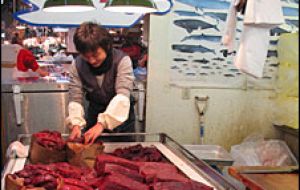MercoPress. South Atlantic News Agency
Iceland and Norway exporting tons of whale meat to Japan
 Fin whale is the most sought after species in Japan's markets
Fin whale is the most sought after species in Japan's markets Companies from Iceland and Norway have begun exporting whale-meat to Japan. About 60 tons of meat from fin whales caught in the 2006 Icelandic hunt was reportedly sent with a much smaller amount of minke meat from Norway according to a report from BBC.
Industry sources told the BBC that the meat had already arrived in Japan, although a Japanese official said no request to import it had been received. Conservation groups say the trade will damage attempts to bridge the gap between pro- and anti-whaling nations. The fin whale is listed as Endangered on the internationally recognized Red List of Threatened Species. But Iceland maintains populations are high enough in the North Atlantic that a small annual kill, such as the seven caught in 2006, is sustainable. This is Iceland's first whale-meat export to Japan in nearly 20 years. Commercial whaling has been banned globally under the International Whaling Commission (IWC) since 1986, but Iceland and Norway lodged formal objections to the ban and their governments issue commercial quotas unilaterally. The global trade in whale-meat is also prohibited under the Convention on International Trade in Endangered Species (CITES), but again the three countries have exempted themselves by lodging formal "reservations". "This trade will be mutually beneficial for the three main whaling countries," said Kristjan Loftsson, CEO of the Icelandic company Hvalur hf which catches fin whales. "This trade is perfectly legal under the domestic legislation of the three countries as well as all relevant international law." Iceland's Fisheries Ministry said it was not an issue that concerned the government. "It's been clear since 2006 that our position was that those who were engaged in [the hunt] could export the products," said Stefan Asmundsson, a senior official in the ministry and Iceland's commissioner to the IWC. "Then it's up to them to do that; and as far as I know they have shipped some product to Japan," he told BBC News. An official in Norway's Directorate of Nature Management confirmed that his government had issued export permits for minke meat totaling 5.3 tonnes to two companies. A spokesman for one of the companies, Myklebust Trading, said the consignment - sent by air - had reached Japan. However, an official in Japan's Fisheries Agency told BBC News that no request for permission to import the meat had been lodged with the government - and such a request was needed, he said. Sue Lieberman, director of the global species programme at the conservation charity WWF, agreed that the trade was legal, but said it went against the principles of these international treaties. "It undermines the effectiveness of CITES if countries are trading under their reservations, and it also undermines the IWC," she said. "There's supposed to be a ban on commercial whaling; and Iceland and Norway keep saying they need to hunt because there's a demand in their own countries, but the trade shows it's not true. "[The Icelandic hunters] killed the fins just because they could get more money for fin than minke meat in Japan." The fin whale meat has been in cold storage since the 2006 season, and Mr Loftsson acknowledged there is no domestic market. For the last year, IWC chairman William Hogarth has been trying to set in train a mechanism that could heal the damaging breach between pro- and anti-whaling countries within the commission. Japan and some anti-whaling countries such as The Netherlands and New Zealand are actively engaged with the initiative, though there is still deep suspicion between opposing camps. "What this decision means is that Iceland, or at least Loftsson, is trying to strangle the effort to find a compromise," said Arni Finnsson from the Iceland Nature Conservation Association (Inca). Mr Finnsson argues, as do other environmentalists, that the continuation of whaling and the decision not to interfere in the whale-meat exports may damage Iceland's economy - already reeling from the international banking crisis - and its candidacy for a seat on the UN Security Council. Following last month's decision to issue a minke quota for 2008, foreign minister Ingibjorg Solrun Gisladottir said Iceland was sacrificing its long-term interests for short-term gain, while the UK was one of the nations criticizing the decision.




Top Comments
Disclaimer & comment rulesCommenting for this story is now closed.
If you have a Facebook account, become a fan and comment on our Facebook Page!